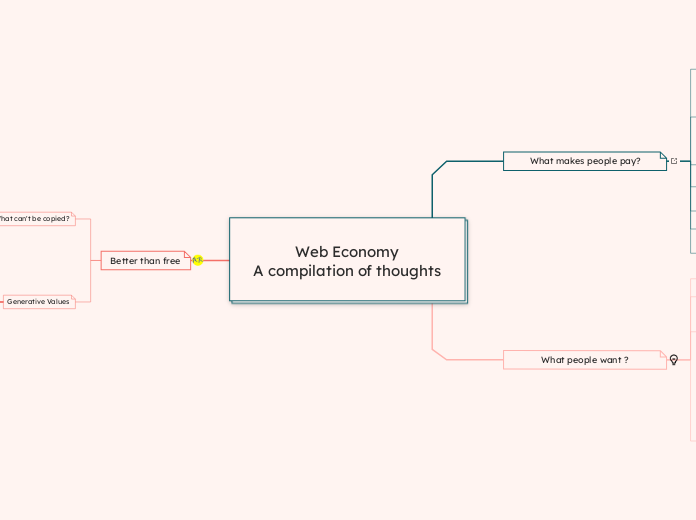Democratic Theory and Ideology
Ideology
that rationalize tied to distinct groups where reality is not fully known neither are the basic contradictions concealed by ideology
Marx
Ideology is meant to conceal the basic contradictions, to reconcile the oppressed to their condition, to make the guilty oppressors feel less bad, to justify imperialism, exploitation and the domination of everyone by a small group of capitalists.
The false beliefs are imperfectly known to us. We can become awae of them but we can never be sure that there are not others that reman hidden.
The Racial Contract
Historical Materialism
False beliefs that rationalize tied to specific groups
Mills on Ideal Theory
False beliefs that "rationalize"
"rationalize" stands for a number of different functions of ideologies. Those need to be enumerated.
False Beliefs
Racism
Sexism
"We are the Chocen People", "Manifest Destiny" "Am Deutschen Wesen muss die Welt genesen"
"false" needs qualification. Often these beliefs are not literally false but they are unsupported prejudices, beliefs that no one has questioned, what everyone says without really thinking about it.
What is not supported by thinking, evidence, arguments.
Neither true nor false
Gauthier
Beliefs
Ryfe
Read
Read and take notes:
Estlund, articles and Democratic Authority
Christiano, anthology and book
Sen
Cohen articles and book on Ro
Social Contract
Rawls
Gutman "Democracy"
Copp
Bohman and Rehg, eds.
Names
Elster
Copp
Estlund
Defend Dem theory
1. Mills accuses white theorists of ignoring racial oppression. But a number of them are very explicit in their opposition to racism. See Estlund's book.
2. Ideal theory, properly understood, does not talk about actual situations. (See Michael Vincent on ideal theory) So why should it be accused of ignoring racism and sexism?
3. The project is admittedly utopian. See Estlung, Christiano
Support Ideology accusation
There are very many political theorists. Many of them are very learned and very skilled in making distinctions, constructing arguments, framing reputations of competing theories.
It is legitimate to ask whether all of these theorists are ideologists or only some. If only some, what percentage? I have no answer to that question. To that extent the thesis of this paper is unsupported, a criticism of some, very few, specific passages in a very few books.
To make this a serious accusation, one would have to write a long book and a pretty tedious one at that. I am too old to do that.
So instead of presenting a thesis, I need to present this paper as asking a question. There are some political theorists of considerable distinction who are, nevertheless, spreading ideology.
The question is how common a phenomenon is this? Some people, equally distinguished, have argued that it is extremely common. (Charles Mills) This question itself is a very urgent question in political theory. Mainstream political theory does not raise it.
Understanding Conversation
Political theorists, at their best describe their conversations as giving reasons. The paradigmatic situation is one where people disagree about policy. In conversations they gave each other reasons in order to persuade the other to give up their interests or their policy recommendations and adopt mine instead. The trump is an Habermas phrase the force of the strongest argument.
What is missing here? There is no talk about listening. But it is good listening? There is no talk about two conditions needed for a good conversation: trust, perhaps friendship of some sort (see Aristotle)
See Fisher and Ury, et al.
why is this important? It may very well be possible that the sorts of conversations democracy demands cannot be more or less universal but up possible only under very limited circumstances. If that is true then talking about democracy as a political system organizing an entire society makes no sense
Many political theorists are thinking hard about the legitimacy of government and tried to construct some sort of ideal democracy to legitimate government. But that may be a foolish project.
In so far as it is ideological it may however serve to legitimate our illegitimate governments.
Subtopic
If it is true that a whole country cannot be democratic in any real sense, going back to Dahl and polyarchy may be really important
Description of Politicl Theory
Political theorist after political theorist describe their task has understanding the best political structures in a situation where people have serious disagreements. The society in which we are trying to have the best democratic institutions we can manage is a society divided by disagreements.
But that is a startling misrepresentation. The deep divisions and our society are not properly described as "disagreements." There are still many men who regard women primarily as sexual objects rather than as equal human beings. The struggle over that humiliation is not in any sense a disagreement. It is not a situation where people believe different statements to be true. It is a situation of differential power where the more powerful group uses its power to humiliate the group with less power.
In spite of advances against racism, many whites still believe that people of color are inferior. They accuse them of incompetence, immorality, criminality and treat them accordingly. Relations between whites and persons of color are not disagreements about the beliefs of whites about people who are not. They are relations of power in which white power is used against persons of color.
One might acknowledge that; it would be difficult not to do so. But one could also say that political theory – being theory or perhaps even "mere theory" – does not have the task to do away with the oppressions that the face our society. Its task is no more than reflect carefully about the best institutions that would include all of us in our political life.
But you cannot do good theory about the best institutions for our political life if you missed describe that life. The institutions we need do not only promise to overcome or, at least, minimize the damage done by our disagreements. An account of democracy that does not talk about the disenfranchisement of women and people of color and the continued repression of those groups – of a majority by a white minority – is not talking about the world we live in and the problems we have.
It is, instead, prettifying the rather ugly reality that many of us have to contend with every day. It is distributing ideology.
Description of Democracy
Here is the idea:
These authors describe democracy as voting, representative democracy, majority rule.
They make two other claims: 1. that describes what we practice and 2. that practice--at its best, not always--satisfies the basic values of democracy: autonomy, freedom, equality, citizen self-determination and empowerment, etc.
Against that I want to argue that what we have today does not at all meet the requirements for democracy.
Other (brief) examples.
Gutman
Gutman in a very brief survey of theories of democracy presents the reader with a variety of conceptions of democracy. Some put the emphasis on the will of the majority, some on the protection of certain rights and immunities for everyone, some on ways of fostering participation, and some on the role of careful reasoning in political discourse. All of these forms of democracy are said to aim at governments that take the fullest possible account of the interests of citizens and fosters their autonomy and self-determination. Gutman recognizes, of course, that actual democracies fall far short of these ideals but she quotes Churchill's quip that democracy is a very bad form of government except all the others.
What are all the others? We know what Churchill had in mind: Stalinist dictatorship in Russia, fascist dictatorship in Germany Italy and Spain between the world wars, military dictatorships in Brazil Argentina and Chile and other, smaller Latin American countries in the post-World War II period.
The implicit thought is that our government, not being a military fascist or Stalinist dictatorship is a democracy even if it is not perfect.
But that is ideology: it leaves out that there are other ways of failing in the democratic process. You may have elections, civil liberties, popular discussions of politics and still have a government of the few over the many. We call that an oligarchy when, as a rule, only the well-connected well-heeled and well-educated are plausible candidates for office, when the greatest political influence goes to the people with the greatest financial resources. Only a minority of persons have their interests taken seriously in forming government policy. Autonomy and self-determination is limited to a small number of citizens.
Democracy may fail in other ways. We say regularly that our democracy is more than 200 years old, counting from the adoption of the U.S. Constitution. But until 1919 half the population was disenfranchised. Until 1964 and another 10 or 15% of the population was not only disenfranchised but also effectively deprived of many human rights. Surely those moves are not compatible with democracy. Shall we say that the American democracy dates to 1964?
Racist exclusions continue in our country. It is much more difficult for persons of color to stay out of jail, to get a good education, to get a professional job. It is still much more difficult for women to occupy positions of leadership or to get paid as much as men do for comparable work. All of these surely have to do with the self-determination and autonomy. How shall we think about that?
We can say that political democracy, equal political rights to the vote will and to running for office are only one condition for autonomy and self-determination. The promise of political democracy is fairly limited. Alternatively we can say that inequality underlying genuine democracy must extend beyond the franchise to equal respect, equal opportunities, and equal recognition for one's ability and one's contribution to the society.
A discussion of democracy that does not touch on these issues is clearly ideological.
Christiano
Tom Chritiano, The Rule of the Many
In the introduction, the author summarizes our ideals for democracy and also tells us that our actual political practice satisfies these ideals albeit only in a minimal fashion. Specifically what is missing is that not all citizens have the wherewithal to play their role as equal participant in the process of governing.
2. "Most believe in the democratic idea that the people have a right to rule, that decisions about what laws and government a people live under are to be made ultimately by it or at least by individuals the people have chosen.… We think that these decisions are to be made in general by majority rule among equal citizens. When there is disagreement, we think that the larger number ought to prevail and the smaller number ought to go along"
3. This idea of democracy is an embodied in popular sovereignty, political inequality and open and fair discussion.
"These ideals are partly realized in features of modern democratic societies. One person one vote is obeyed in the process of electing representatives… Anyone may run for election to public office… The political campaigns of candidates and parties consist in large part in discussion and argument over the worth of these opposing views… Everyone is permitted to have a say… The society tolerates and often encourages vigorous debate on all issues of public interest"
5. The obstacles to a fuller realization of our ideals in actual democratic societies. a. Modern societies are terribly complex no one is an expert in all the things one would need to be an expert in. b. There are so many voters that one person's vote does not make a lot of difference so there is no reason for them to inform themselves.
6. That suggests that "the ideal of citizens participating in serious and rational discussions about the organization of society seems to be a pipe dream." But the author thinks that that is not really true. He will go on to argue in the book that individual citizens who have motives for informing themselves and participating and that, besides, citizens have a legitimate place in the democratic process and spite of the problem of the division of labor. Much later in the book the author argues that it is the task of ordinary, nonspecialized citizens to determine the aims of the society. (169)
Criticism
The criticism must show that the claims for our democracy made by the author are false: quite a part from the where with all issue people do not have equal opportunities to run for office. Electing representatives is not a way of choosing policies. One and the same representative and endorses many policies and which of those I disapprove of by not voting for this person is totally unknown. Choosing aims is, to begin with terribly difficult and not a sensible task to assign to ordinary voters. Secondly aims are usually pretty vague and thus the choice of some vague slogan is hardly useful. Thirdly the ideal of democracy sketched out – that the people ruled – cannot be realized by people choosing goals unless they are able to and sure there are being actual goals of actual government actions. Voters have very little power to do that.
Gutman in a very brief survey of theories of democracy presents the reader with a variety of conceptions of democracy. Some put the emphasis on the will of the majority, some on the protection of certain rights and immunities for everyone, some on ways of fostering participation, and some on the role of careful reasoning in political discourse. All of these forms of democracy are said to aim at governments that take the fullest possible account of the interests of citizens and fosters their autonomy and self-determination. Gutman recognizes, of course, that actual democracies fall far short of these ideals but she quotes Churchill's quip that democracy is a very bad form of government except all the others.
What are all the others? We know what Churchill had in mind: Stalinist dictatorship in Russia, fascist dictatorship in Germany Italy and Spain between the world wars, military dictatorships in Brazil Argentina and Chile and other, smaller Latin American countries in the post-World War II period.
The implicit thought is that our government, not being a military fascist or Stalinist dictatorship is a democracy even if it is not perfect.
But that is ideology: it leaves out that there are other ways of failing in the democratic process. You may have elections, civil liberties, popular discussions of politics and still have a government of the few over the many. We call that an oligarchy when, as a rule, only the well-connected well-heeled and well-educated are plausible candidates for office, when the greatest political influence goes to the people with the greatest financial resources. Only a minority of persons have their interests taken seriously in forming government policy. Autonomy and self-determination is limited to a small number of citizens.
Democracy may fail in other ways. We say regularly that our democracy is more than 200 years old, counting from the adoption of the U.S. Constitution. But until 1919 half the population was disenfranchised. Until 1964 and another 10 or 15% of the population was not only disenfranchised but also effectively deprived of many human rights. Surely those moves are not compatible with democracy. Shall we say that the American democracy dates to 1964?
Racist exclusions continue in our country. It is much more difficult for persons of color to stay out of jail, to get a good education, to get a professional job. It is still much more difficult for women to occupy positions of leadership or to get paid as much as men do for comparable work. All of these surely have to do with the self-determination and autonomy. How shall we think about that?
We can say that political democracy, equal political rights to the vote will and to running for office are only one condition for autonomy and self-determination. The promise of political democracy is fairly limited. Alternatively we can say that inequality underlying genuine democracy must extend beyond the franchise to equal respect, equal opportunities, and equal recognition for one's ability and one's contribution to the society.
A discussion of democracy that does not touch on these issues is clearly ideological.









